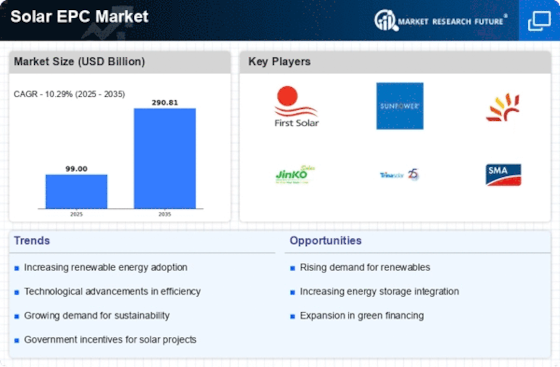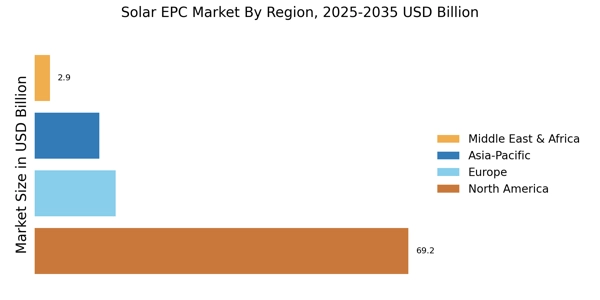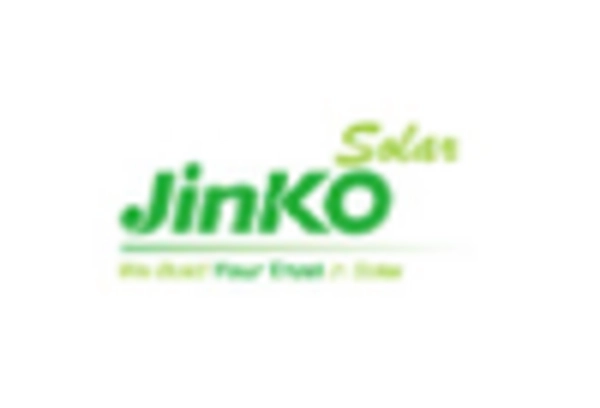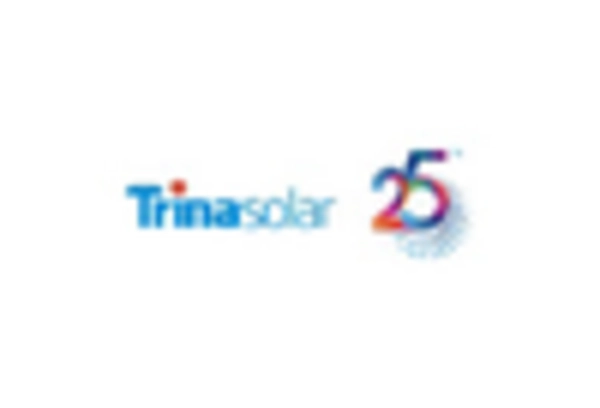Government Incentives and Policies
Government incentives and supportive policies play a crucial role in driving the Solar EPC Market. Many countries have implemented tax credits, rebates, and feed-in tariffs to encourage solar energy adoption. For instance, in several regions, the installation of solar photovoltaic systems is often subsidized, making it financially attractive for both residential and commercial users. This regulatory framework not only stimulates demand but also enhances the viability of solar projects. As of 2025, it is estimated that government policies could contribute to a 30% increase in solar installations, thereby significantly impacting the Solar EPC Market. The alignment of policy frameworks with renewable energy goals is likely to create a favorable environment for solar EPC companies.
Corporate Sustainability Initiatives
Corporate sustainability initiatives are increasingly influencing the Solar EPC Market. Many companies are adopting renewable energy solutions as part of their corporate social responsibility strategies. This trend is driven by a growing awareness of environmental issues and the need for businesses to reduce their carbon footprints. As of 2025, it is projected that over 60% of Fortune 500 companies will have committed to using renewable energy sources, including solar. This shift not only enhances corporate image but also leads to cost savings in energy expenditures. Consequently, the demand for solar EPC services is likely to rise as businesses seek to implement solar projects. The alignment of corporate goals with sustainability objectives is expected to further propel the Solar EPC Market.
Increasing Demand for Renewable Energy
The rising demand for renewable energy sources is a primary driver of the Solar EPC Market. As nations strive to meet their energy needs sustainably, solar energy has emerged as a preferred option. According to recent data, solar energy capacity has been expanding at an annual growth rate of approximately 20%. This trend indicates a robust shift towards cleaner energy solutions, prompting investments in solar projects. The Solar EPC Market is likely to benefit from this increasing demand, as more companies and governments seek to implement solar energy systems. Furthermore, the transition to renewable energy is often supported by public sentiment favoring environmental sustainability, which further propels the growth of the Solar EPC Market.
Technological Innovations in Solar Energy
Technological innovations are transforming the Solar EPC Market by enhancing the efficiency and affordability of solar energy systems. Advances in photovoltaic technology, such as bifacial solar panels and energy storage solutions, are making solar installations more effective. The introduction of smart grid technologies also facilitates better integration of solar energy into existing power systems. As of 2025, the efficiency of solar panels has improved by over 15% compared to previous generations, which is likely to drive further adoption. These innovations not only reduce the cost of solar energy but also increase its reliability, thereby attracting more investors and stakeholders to the Solar EPC Market. The continuous evolution of technology is expected to sustain growth in this sector.
Rising Energy Costs and Energy Security Concerns
Rising energy costs and concerns over energy security are significant drivers of the Solar EPC Market. As traditional energy prices fluctuate, consumers and businesses are increasingly looking for stable and predictable energy sources. Solar energy offers a viable solution, as it can provide long-term cost savings and energy independence. In recent years, energy prices have seen considerable volatility, prompting a shift towards renewable sources. By 2025, it is anticipated that solar energy could account for a substantial portion of energy consumption, driven by its cost-effectiveness and reliability. This trend is likely to encourage investments in solar projects, thereby boosting the Solar EPC Market. The dual focus on cost savings and energy security is expected to sustain the momentum of solar energy adoption.


















